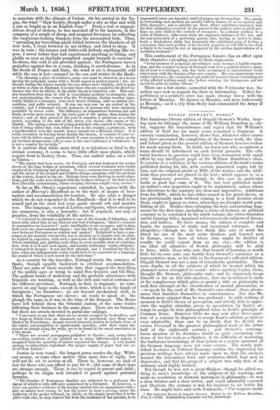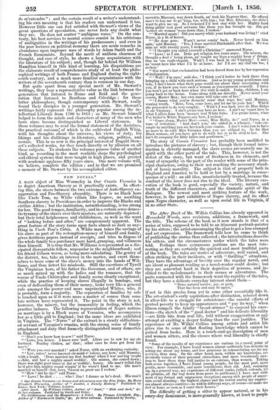DIIOALD STEWART'S WORKS..
THEE handsome library edition of Dugald Stewart's Works, bear- ing upon its titlepage the name of Sir William Hamilton as edi- tor, suggests the remembrance and regret that Sir William's edition of Reid has for many years remained a fragment. A cursory examination' however, shows that, whatever other causes may have prevented the completion of the former work, the time and labour given to the present edition of Stewart does not reckon for much among them. In truth, we know not why so eminent a name should be introduced on such trivial grounds. The edi- torial business in question could have been transacted with equal effect by any intelligent pupil of Sir William Hamilton's class. It consists in a collation of the various editions of Stewart's works published during his life, with certain annotated copies left by him, and the original proofs or MSS. of the works ; and the addi- tions thus procured are placed. in the text ; which appears to us a very dangerous practice, though in this case no particular harm or good has come of it. The last text published. under an author's own inspection might to be maintained, unless where his directions to the contrary are clear and imperative. Additions from his MSS. which he has either erased in ltproof-sheets, or has provisionally made without coming to a l decision about them ought to appear as notes, when they are thought worth pub- lishing at all. Besides thus enlarging the text, and printing frag- ments for the first time including a series of lectures on political economy to be concluded in the ninth volume, the editor furnishes useful running titles, marginal references to the subjetth of discus- sion, and indices. By these means, the edition is complete and. handy for purposes of study and occasional reference. And. altogether,—though we do not think this sort of work the fittest for one of the most acute thinkers and learned. men in Europe, every hour of whose time might be fruitful of results we could. expect from no one else,—the edition is one that all admirers of Scotch philosophy- will be glad. to have, while those who rate that branch of learning as worth little for its own sake can hardly deny Stewart's eminence as a representative-man, or his title to the honour of a collected edition. Dugald Stewart was not a man of remarkable profundity. There were depths in all the subjects of which he treated which his plummet never attempted to sound: where mystery begins, there, thought Mr. Stewart, philosophy ends ; and he vigorously keeps himself so far on this side mystery, that one is inclined to s
at the complacency which gives so grand a title as philosophy to such first attempts at the classification of mental phenomena, or —to speak by the card of Mr. Stewart's own school—those pheno- mena that manifest themselves in consciousness. Nor was Mr. Stewart more original than he was profound ; he adds nothing of moment to Reid's theory of perception, and utterly fails to appre- ciate the mighty stimulus given to speculation by Kant's at- tempt to assign its true philosophical value to Reid's principle of Common Sense. However little we may now after three-quar- ters of a century be disposed to accept Kant's solution as final or even admissible, there can be no doubt that the .Kritik der reinen Vernun,ft is the greatest philosophical work of the latter half of the eighteenth century ; and Stewart's contemp- tuous mention of its doctrines would. be quite convincing evi- dence of his low rank as a thinker, if the difficulty of mastering the barbarous terminology of that system to a person ignorant of the German language were not some excuse. The newly i pub-
lhed Lectures on Political Economy confirm the impression his previous writings have always made upon us, that his analysis wanted the determined force and acuteness which lead men to discoveries, and that his grasp of a subject was only that of an ordinary mind highly trained. But though he was not a great thinker—though he added no- thing to men's knowledge on the subjects of his teaching, and made no revolution or forward movement in.philosophy—he was a clear thinker and a clear writer, and could admirably expound and illustrate the systems it was his business to set before his class. He might have said with Fontenelle, " J'ai toujours tache • The Collected Works of Dugald Stewart. Edited by Sir William Hamilton. • rots. L—nu. Published by Constable and Co., Edinburgh.
de m'entendre " ; and the certain result of a writer's understand- ing his own meaning is that his readers can understand it too. However little one can feel satisfied with Stewart's views of the great questions of speculation, one never feels any doubt what they are. He does not scatter " ambigaas voces." On the con- trary, his best services to mental science consist in his criticisms of ambiguities in the writings of his predecessors ; and even in the poor lectures on political economy there are acute remarks in abundance upon improper uses of words by Adam Smith and the French Economists. Beyond the merit of uniform clearness of thought, and ease of style, he shows a large acquaintance with the literature of his subject; and, though far behind Sir William Hamilton himself in this kind of learning, his disquisitions are the elaborate result of comprehensive study of at least the philo- sophical writings of both France and England during the eight- eenth century, and a much more familiar acquaintance with the writers of the seventeenth century than is common in our day. But quite apart from any special merit of Mr. Stewart's writings, they bear a representative value as the link between the generation that listened to Hume and Reid and the gene- ration that listened to Bentham and Coleridge ; for these latter philosophers, though contemporary with Stewart, really found their disciples in a younger generation. Mr. Stewart's writings fairly represent the philosophy popular among the in- tellectual Liberals from 1790 to 1815; as Mr. Stewart himself helped to form the minds and characters of many of the men who have since become distinguished as Liberal statesmen. In these volumes may be read the formal statement of the doctrines, the practical outcome; of which is the cultivated English Whig, with his thoughts about the universe, his views of duty, his likings and his disliking% in literature, religion, politics, and morals. This to us now is the principal interest of Dugald Stew- art's collected works, for they touch directly or by allusion on all these subjects. To students the volumes possess value of another kind, as recording in the most readable shape the psychological and ethical systems that were taught in high places, and greeted with academic applause fifty years since. One more volume will, we believe, complete the edition ; and in that we are promised a memoir of Mr. Stewart by his accomplished editor.



































 Previous page
Previous page